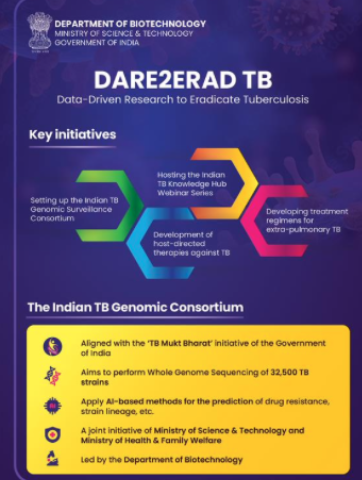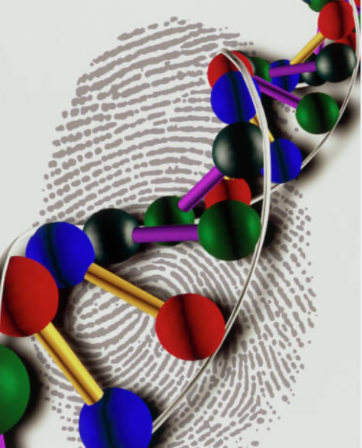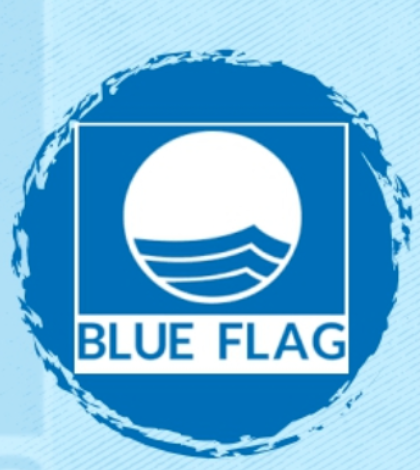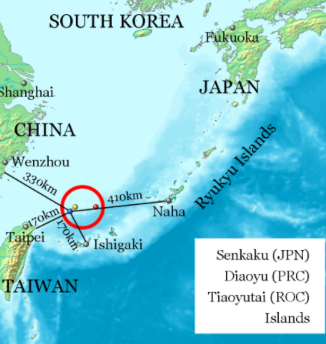Daily Current Affairs | March 26 2025
Important Topics from Current Affairs : 1) Dare2eraD Tb Initiative 2) DNA Polymorphism 3) Blue Flag Certification 4) Issue of Senkaku Island
Jumbo IAS
3/26/20254 min read
1) Dare2eraD Tb Initiative
In a significant breakthrough in the fight against tuberculosis, India announced the completion of genome sequencing of 10,000 isolates of “Mycobacterium tuberculosis” at a summit organised on occasion of "World TB Day" (24th March) at Vigyan Bhawan.
The achievement marks a major stride in India's commitment to eradicating TB ahead of the World Health Organisation’s (WHO) 2030 targets.


About the Program
Dare2eraD TB program (Data Driven Research to Eradicate TB), launched on March 24, 2022, focuses on data-driven research to eradicate TB.
A key component of this initiative is the Indian Tuberculosis Genomic Surveillance (InTGS) Consortium, spearheaded by the DBT, CSIR and ICMR.
The program aims to sequence over 32,000 TB isolates to identify drug resistance mutations and improve treatment outcome.
Key Features of Dare2eraD Tb
Multi-laboratory network collaboration with sequencing and analysis at top institutes.
Data storage at the Indian Biological Data Centre (RCB, Faridabad).
Genome data integrated with epidemiological findings for actionable interventions.
Benefits :
Improve diagnostic accuracy and enable faster resistance profiling for quick drug resistance prediction.
It will reduce the time needed to determine effective treatments from weeks to mere hours or days.
Take us closer to the goal of eliminating Tb.
2) DNA Polymorphism
Just like the government uses an Aadhaar number to uniquely identify an individual for social security purposes, a person’s DNA fingerprint can be used for biological purposes.
DNA polymorphisms and their role in DNA Fingerprinting can be used to identify criminals, exonerating the wrongly accused, and solving cold cases.
DNA polymorphisms are variations in DNA sequences among individuals. These genetic differences occur at specific locations in DNA and help differentiate one person from another.


About DNA
DNA (Deoxyribonucleic Acid) is the genetic material present in almost all cells of the human body (skin, blood, bone, teeth, etc.).
Humans have 46 DNA molecules (chromosomes) or 23 pairs of Chromosomes(each pair inherited from each parent).
Chromosomes contain genes, which carry instructions for traits like eye colour, height, and susceptibility to diseases.
More on DNA Polymorphism
DNA polymorphisms, through STR analysis and PCR, enable forensic breakthroughs in justice (exonerations, crime-solving) and historical revelations via ancient DNA extraction.
Short Tandem Repeats (STR) Analysis - STRs are short sequences of DNA bases (A, T, C, G) that repeat multiple times. Each person has a unique STR pattern, making STRs highly useful for DNA based identification
Polymerase Chain Reaction (PCR) - It is a technique used to amplify DNA segments, making millions of copies. PCR is essential for DNA fingerprinting, criminal investigations, and medical research.
DNA Fingerprinting - DNA fingerprinting, also known as DNA profiling, is a forensic technique that identifies individuals based on unique patterns in their DNA.
3) Blue Flag Certification
Rushikonda Beach in Visakhapatnam has regained its prestigious Blue Flag certification after temporary withdrawal due to compliance issues.
Blue Flag Certification - A globally recognised eco-label awarded by the Foundation for Environmental Education (FEE) to beaches, marinas, and sustainable boating tourism operators that meet stringent environmental and safety standards.


Criteria
To achieve Blue Flag certification, beaches, marinas, and sustainable boating tourism operators must meet 33 criteria covering 4 focus areas.
Focus Areas - Environmental Quality, Safety(for tourists & beachgoers), Environmental Education, and Sustainable Tourism.
Awarded by Denmark based Foundation for Environmental Education (FEE).
Blue Flag Certification and India
In each country, a National Operator designated by the Foundation for Environmental Education (FEE) is responsible for conducting scheduled and surprise control visits to Blue Flag beaches.
In India, Blue Flag India under the Society of Integrated Coastal Management (SICOM) acts as the National Operator.
India boasts 12 Blue Flag certified beaches, including Golden Beach (Odisha), Shivrajpur Beach (Gujarat), Kappad Beach (Kerala), Ghoghla Beach (Diu), Radhanagar Beach (Andaman & Nicobar), and others.
4) Issue of Senkaku Island
Japan has voiced serious concerns over a prolonged incursion by Chinese Coast Guard ships near the disputed Senkaku Islands in the East China Sea, marking one of the longest intrusions into Japan’s territorial waters.
The Chinese ships, which claim the islands for Beijing, left after remaining in the area for 92 hours and 8 minutes.


Senkaku Islands
Located in East China Sea, it is a group of eight uninhabited islands with a total area of approximately 7 sq km.
Known as Diaoyu Islands in China and Diaoyutai Islands in Taiwan, these islands have been administered by Japan since 1972.
After World War II, these islands came under US Trusteeship under Treaty of San Francisco 1951.
These were later returned to Japan in 1971.
With the discovery of oil and gas reserves, China started asserting control in this region since 1970s.
Significance of Senkaku Islands
Shipping Lanes of Communication - These islands have close proximity to shipping lanes of trade between East Asia and the rest of the World.
Resources - These islands have rich fishing grounds and potential oil and gas reserves.
Geopolitical Significance - The islands are also seen as a focal point in the broader geopolitical rivalry between China and the US, with Japan being a key US ally.


